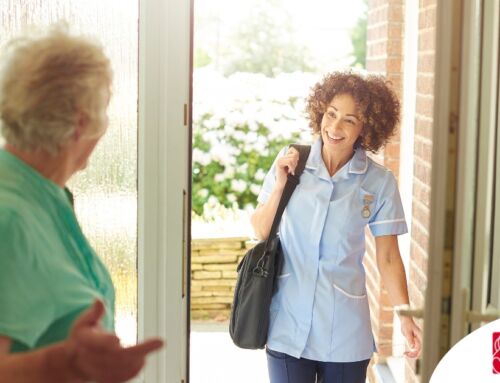In the United States, there are about twelve million people who require home health care in some form. The American population is aging. Adults age 65 and older make up at least 15 percent of the populace. Additionally, there are at least 10,000 Baby Boomers celebrating their 65th birthdays every single day. One of those aging people could be your mother, father, family member or friend.
You may have noted physical or mental functional changes in your loved one. Or perhaps they display waning interest in hobbies or activities they once enjoyed. We can help you address concerns about a loved one’s future if you’ve been asking yourself, “Do I need help with senior care?”
Signs Someone You Love Might Need Home Care
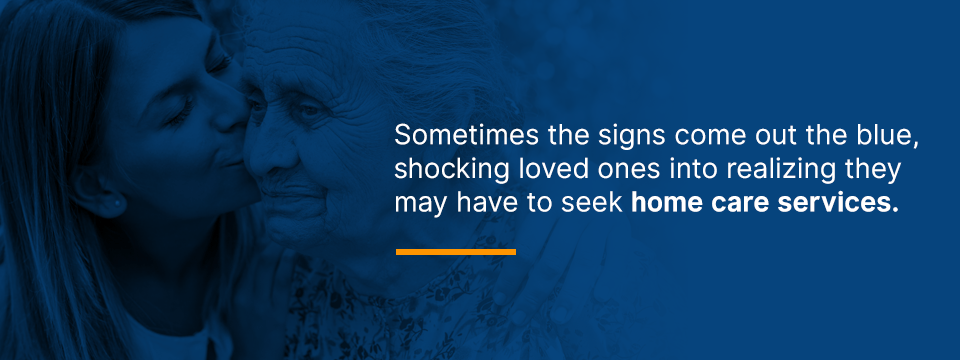
Sometimes the signs come out the blue, shocking loved ones into realizing they may have to seek home care services. Other times, the signs show up gradually. As people grow older, it is not easy for them to admit they might need help. It’s hard for many seniors to accept assistance from loved ones as well. You may wonder how to know when elderly parents need help.
Something as simple as an unexplained bruise, confusion during everyday tasks, or bad judgment about money are just a few indicators. Maybe your usually neat mother has stopped cleaning the house, or rotting food has gathered in your father’s sink without him noticing. Look for these additional warning signs in your loved one that help you decide when to get help with senior care:
- Sleeping for most of the day.
- Weight gain from forgetting they have eaten meals, then eating again.
- Weight loss from forgetting to eat.
- Drastic mood swings or changes.
- Difficulty walking or standing up after being seated.
- Scuff marks or wear on walls, door jams, and furniture used to steady themselves when walking through their home.
- Forgetting to take medications or taking incorrect dosages.
- Unusual or unpleasant body odor from not showering or bathing as often, including a persistent odor of urine on their clothes or around the house.
- Lack of or obvious neglect of grooming, such as messy hair, long nails, not brushing or flossing teeth and dirty or stained clothing.
- Unopened mail piles or a mailbox that’s full and overflowing.
- Bounced checks and late payment notices in the mail.
- Mysterious dents and scratches on their automobiles.
- Trouble driving a car.
- Forgetting to turn off appliances, blow out candles or extinguish their pipe, cigars or cigarettes if they smoke.
Signs You Need Help As a Caregiver
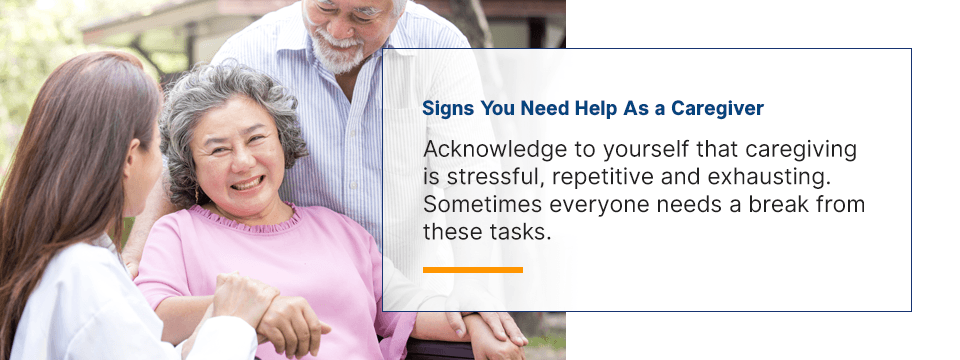
Caregivers willingly tackle difficult, sometimes unpleasant tasks. They do this while bearing the weight of the responsibilities regarding someone’s life and well being every single day and night.
Undeniably, caregiving has tough moments. Even though the work is often hard, we do it because an elderly loved one needs us. Acknowledge to yourself that caregiving is stressful, repetitive and exhausting. Sometimes everyone needs a break from these tasks.
How do you recognize signs you need help as a caregiver? How do you know when you might need the aid of respite care services? Demonstrating any of the following may indicate you need to get help with senior care:
- Impatience: Many caregivers have a lot of patience. Caregivers fill out forms. They wait at doctors’ offices. They stand in line at the pharmacy for a prescription to be filled. Caregivers have to be incredibly patient for every part of the job. When your patience wears thin and you show more frustration than patience, you could have a need for respite care.
- Irritability: A caregiver often has the same dialogue with their loved one repeatedly. That is, until they just can’t anymore. When the repetition becomes intolerable, they may just snap at their elderly loved one. If this starts to happen too often, it may be time for help.
- Making mistakes: Caregivers must be meticulous when it comes to counting, sorting and measuring dosages of medications and supplements. They know when to refresh the incontinence supplies. They schedule doctor appointments. Sometimes they do this while working. Running out of meds, making a dosage mistake, and missing or jumbling up appointments are warning signs that the caregiver feels overwhelmed.
- Sickness or injury: The caregiver getting sick or injured is a sure sign respite care is needed. A caregiver cannot properly care for a loved one when they themselves need to get well or heal an injury.
- Depression: Depression often presents itself when least expected. Caregivers feel they are doing a wonderful, positive thing by helping a senior loved one with home care. Watching a loved one go through a physical or mental decline is hard. The caregiver grieves every day for what their loved one is losing. Resentment may grow because the caregiver feels like they placed their own life on hold for their loved one. Respite is absolutely necessary if depression occurs. Please note that if depression has lasted for a long time, you may need more help than respite care.
- Loneliness and isolation: If it’s been a long time since you’ve had conversations that don’t revolve around medication, incontinence, or doctors’ appointments, it may be time for a break. Have you had a date night with your significant other recently or indulged in a girls’ or guys’ night out? If you haven’t had any fun in a while, it might be time to give yourself a break.
- Personal time: Free time is a luxury to caregivers. They can watch a movie, read a book or go for a run before or after they give care. Fun activities might seem completely foreign or out of reach, but you need time to do these things. If it’s been ages since you’ve enjoyed some personal time, seek out respite care and go relax.
Getting Started With Home Care
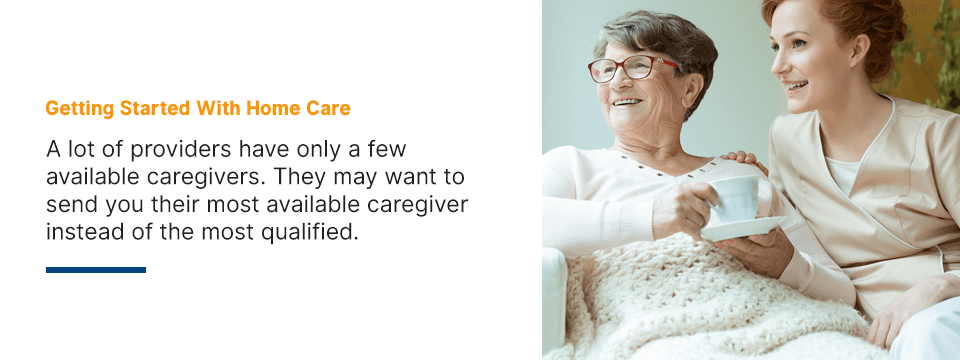
Finding a home care provider can be overwhelming and confusing. There are so many home care agencies from which to choose when you need help for the elderly living at home. Take a deep breath, exhale and grab a pen and notebook. Or you can type up a document to organize your research. Look online to find out which companies can meet your needs. It doesn’t have to be difficult to figure out how to get help with senior care.
A thorough and detailed interview is the best way to find out who you may be hiring. Agencies or caregivers who can’t or won’t answer all your questions are not ones you want to leave responsible for your loved one. You should seek out a home caregiver who is educated, compassionate, and transparent. Request references from the provider and any potential caregivers, and make sure you know what care services they can offer.
Ask these questions about compliance, finances and care specifics as a good starting point in your search for the right caregiver:
- Is your agency licensed by the state?
- Do you bond and insure the caregivers you hire?
- How do you assess, hire and evaluate your caregivers?
- What does your pre-employment process involve? Do you also do additional yearly screenings of employees?
- How often do you perform evaluations of your caregivers?
- What kind of training do you give caregivers? How do you report non-compliance?
- How do you train your caregivers to handle emergencies?
- Have you fired any caregivers? Why?
- What will happen if the caregiver doesn’t show up or shows up late?
- Do you accept Long Term Care Insurance? What insurance plans do you take? Do I have to submit claims to the insurance company or will the provider submit the claims for me?
- What services are included in the cost, and which expenses are not included?
A lot of providers have only a few available caregivers. They may want to send you their most available caregiver instead of the most qualified. Be sure to interview several caregivers so you can decide who your loved one’s best fit will be. Also, ask if you will always receive the same caregiver or if they will rotate. And find out the policy for when your loved one wants a different caregiver.
Sometimes there are different prices for personal care, companion care or an expert-level caregiver hired for a patient with a chronic condition. Go over what will be covered, such as:
- Physical needs: Bathing, grooming, dressing needs. Meals, mobility and incontinence issues also fall into this category.
- Scheduling needs: Sleep, meals and medication. Talk about medical or therapy appointments also.
- Emotional needs: Ask about social interaction, activities, companionship and conversation. If this is important to you and your loved one, address it with any potential home care provider.
- Homemaking: Preparation of meals, grocery shopping, linens, laundry and light housekeeping.
- Scheduling of logistics: Home access, details of what happens with scheduling changes, caregiver changes and how they are handled.
Types of Home Care
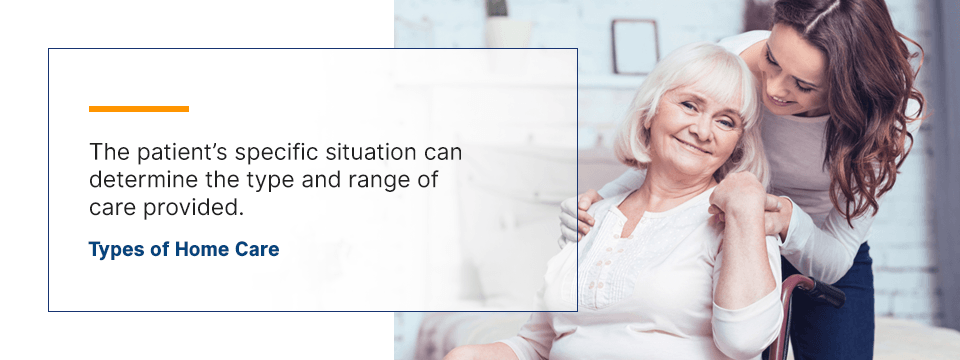
There is a vast selection of home health care services to choose from. The patient’s specific situation can determine the type and range of care provided. Your loved one’s doctor can help you figure out a care plan and the type(s) needed. Here is a sampling of at-home care services:
- Doctor care: Doctors can visit patients at home for diagnosis and treatment. A periodic review of the home health care plan may also be part of the plan.
- Nursing care: This is the most common type of home health care services. A registered nurse will establish a care plan after talking to the patient’s doctor. Nurse care includes dressing wounds, IV therapy, ostomy-related care, giving out meds, pain management and other support issues.
- Physical, occupational and/or speech therapy: Some home care patients need help learning to perform daily tasks again or work on speech functions after an injury or illness. A physical therapist can plan care to regain use of specific muscles and joints. Occupational therapists help patients with relearning daily functions such as eating, bathing and dressing. A speech therapist assists patients with impaired speech so they can relearn the ability to speak and communicate clearly.
- Social services (medical): Social workers on the medical side provide many different services to patients. These services include counseling and locating community resources designed to help patients with their recovery.
- Home health aides: A home health aide assists with the patient’s basic needs like getting up and out of bed, bathtime, getting dressed and walking. Some aides have been trained by a nurse so they can provide specialized care in the presence of a nurse.
- Basic assistance or homemaker care: A homemaker or aide who assists with chores, home tasks, preparing meals, helping with laundry, grocery shopping and other housekeeping tasks.
- Companionship care: Some patients might need a companion to give comfort and supervision. Companions can assist with household tasks.
Benefits of Senior Home Care Help With CareGivers of America of Aventura, Florida

We specialize in providing referrals for in-home care and companion care services. We are an AHCA licensed Nurse Registry committed to helping find in-home caregivers for families in Aventura and throughout the surrounding areas who do not want to use a nursing home or an assisted living facility. We provide Aventura respite care professionals along with connections to a variety of care-related services. The advantages of working with CareGivers of America include:
- We refer you to skilled nurses and caregivers who hold professional licenses and certifications.
- We put our all into a commitment to provide resources for high-quality professional at-home care in Miami-Dade, Broward and Monroe Counties. You always receive complimentary caregiver interviews to get the right fit for each family.
- We promise our clients are our most valuable asset. We hold the caregivers we work with to the highest possible standard of care.
- We run regularly scheduled quality checks to ensure that every single client remains happy with our services and referrals.
- We sit down with families to educate them about their options and answer all their questions.
- We strive to be the best Broward & Miami-Dade County senior home care referral service. We get to know each of our clients individually so we can match them with a caregiver with whom they will feel comfortable.
- We guarantee long-term care insurance free activation and do not require any minimum hours of service.
CareGivers of America wants to provide you with peace of mind by connecting you with long-term, compassionate care. We proudly serve South Florida. This covers Aventura, Sunny Isles Beach, Coral Gables, Miami and North Miami Beaches, Cutler Bay, Pinecrest, North Miami Beach, Key Biscayne, Bal Harbour and Surfside.
Learn more about how we can help connect you to a 24-hour, overnight or live-in care program if you have a loved one who needs round-the-clock care. If you do allow us to find someone to help your loved one, you will receive an instant 10% discount on your first month of service by filling out this short questionnaire.
We understand that it can feel overwhelming to take that first big step of getting home care for your loved one. CareGivers of America promises to help you with every step of this journey. Get in touch to schedule a free home visit. Call (954) 206-1178 or contact us online.


